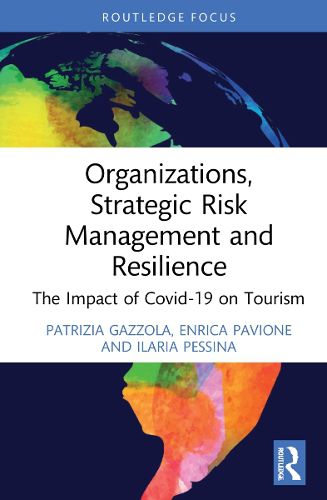Readings Newsletter
Become a Readings Member to make your shopping experience even easier.
Sign in or sign up for free!
You’re not far away from qualifying for FREE standard shipping within Australia
You’ve qualified for FREE standard shipping within Australia
The cart is loading…






Organizations, Strategic Risk Management and Resilience: The Impact of COVID-19 on Tourism aims to identify, analyse and underline the importance of having a conceptual framework designed to develop and improve the risk management and resilience for organizations, particularly during times of crisis.
In the aftermath of COVID-19, it is of paramount importance to predict the trajectory of change in consumer behaviour to help managers identify the basis of a resilience strategy to ideally respond to the current situation. In particular, the book focuses on the analysis and description of the Italian tourism sector, giving a report on how the tourism sector reacted to COVID-19, underlining the importance to adopt a resilient approach relevant for evaluating the effective impact of the pandemic dynamics and to provide support tools for decision-makers to be prepared for the unexpected and to be able to follow a smart adaptation.
The book shows the latest state of knowledge on the topic and will be of interest to students at an advanced level, academics and reflective practitioners in the fields of strategic and risk management and the business of tourism.
$9.00 standard shipping within Australia
FREE standard shipping within Australia for orders over $100.00
Express & International shipping calculated at checkout
Organizations, Strategic Risk Management and Resilience: The Impact of COVID-19 on Tourism aims to identify, analyse and underline the importance of having a conceptual framework designed to develop and improve the risk management and resilience for organizations, particularly during times of crisis.
In the aftermath of COVID-19, it is of paramount importance to predict the trajectory of change in consumer behaviour to help managers identify the basis of a resilience strategy to ideally respond to the current situation. In particular, the book focuses on the analysis and description of the Italian tourism sector, giving a report on how the tourism sector reacted to COVID-19, underlining the importance to adopt a resilient approach relevant for evaluating the effective impact of the pandemic dynamics and to provide support tools for decision-makers to be prepared for the unexpected and to be able to follow a smart adaptation.
The book shows the latest state of knowledge on the topic and will be of interest to students at an advanced level, academics and reflective practitioners in the fields of strategic and risk management and the business of tourism.